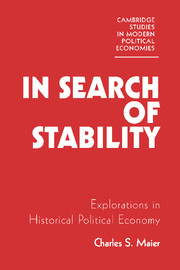Book contents
- Frontmatter
- Contents
- Acknowledgments
- Introduction: Political economy and history
- Part I Ideology and economics from World War I to midcentury
- 1 Society as factory
- 2 The economics of Fascism and Nazism
- 3 The politics of productivity: foundations of American international economic policy after World War II
- 4 The two postwar eras and the conditions for stability in twentieth-century Western Europe
- Part II Collective preferences and public outcomes
- Conclusion: why stability?
- Index
2 - The economics of Fascism and Nazism
Published online by Cambridge University Press: 15 December 2009
- Frontmatter
- Contents
- Acknowledgments
- Introduction: Political economy and history
- Part I Ideology and economics from World War I to midcentury
- 1 Society as factory
- 2 The economics of Fascism and Nazism
- 3 The politics of productivity: foundations of American international economic policy after World War II
- 4 The two postwar eras and the conditions for stability in twentieth-century Western Europe
- Part II Collective preferences and public outcomes
- Conclusion: why stability?
- Index
Summary
An early version of this chapter was prepared for a conference at the Kellogg Institute of Notre Dame University in April 1984 honoring the work of Albert O. Hirschman. That contribution was published as “The Economics of Fascism and Nazism: Premises and Performance,” in Alejandro Foxley, Michael S. McPherson, and Guillermo O'Donnell, eds., Development, Democracy, and the Art of Trespassing: Essays in Honor of Albert O. Hirschman (Notre Dame, Ind.: University of Notre Dame Press, 1986), 57–88. The original paper was proposed as an examination of development and economic management under nondemocratic conditions. This expanded version rests on a wider survey of the literature and statistical material; it has a new introduction and examines some of the important controversies about the Depression and wartime performance in greater detail. I have benefited from discussion at the Columbia Economic History Seminar, the Harvard Economic History Workshop, and the Harvard Center for European Studies Seminar on the State and Capitalism. Steven Marglin pressed me to think through the issues raised by German recovery from the Depression. Alan Milward and Tim Mason read the penultimate version very closely. They raised important questions and pointed out some errors. Those that remain are my responsibility.
Introduction: two generations of studies
The economic claims of Italian Fascism and German Nazism proved a subject of compelling interest from their inception. In the 1930s and 1940s they aroused impassioned and significant debate. Apologists vaunted Fascism and National Socialism as political systems that would overcome the selfishness and chaos of interwar capitalism without recourse to a stultifying collectivism.
- Type
- Chapter
- Information
- In Search of StabilityExplorations in Historical Political Economy, pp. 70 - 120Publisher: Cambridge University PressPrint publication year: 1988

